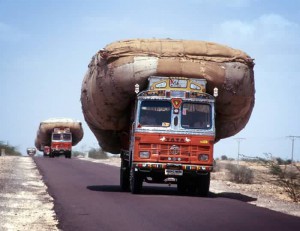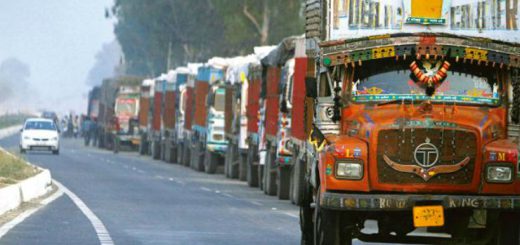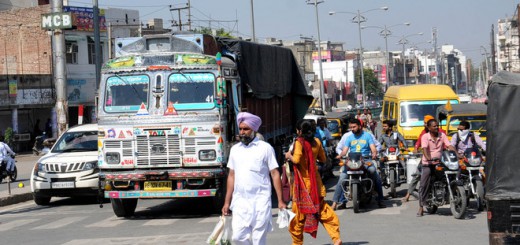Overloaded Trucks- A Threat to Road Safety
Overloaded vehicles on Indian roads are an unfortunate yet common sight. While city roads are spared to some extent, highways are another story. Trucks after trucks, carrying more than their maximum capacity, navigate busy Indian roads. Up until 2005, overloaded trucks did not face any scrutiny nor did they have to pay a penalty. While most state governments issued tokens allowing the overloading of trucks after the payment of a fixed charge, others issued private passes through Transport Offices to allow overloaded trucks to pass through the state.
This scenario changed in 2005 after the Supreme Court issued an order to ban and penalise overloaded vehicles on all Indian roads. According to the judgment, any overloaded vehicle spotted on roads or highways is to be stopped and the extra load to be confiscated. The transporter would have to bear the cost of the off-loading and a heavy fine on the extra load. The judgment came as a welcome move towards the development of the infrastructure in India. With Crores of rupees being used in building highways and roads, tough measures are necessary to sustain development.
Indian roads are not as wide or well-maintained compared to roads in developed nations. They are meant to handle an axle load of approximately 8.16 tonnes and last for about 10-12 years. Even a 10 percent increase in the weight above this limit causes enough damage to reduce the lifespan of the road by a whopping 35 percent. While the Supreme Court order will help maintain roads more efficiently, there are limitations in its implementation. For example, all states are not equipped to handle offloading of the extra weight at checkpoints as it is not a straight-forward task. However, overloaded vehicles face a strict scrutiny and are penalised heavily to discourage them from overloading in the future.
This, however, cannot be considered to be a long-term solution to the problem. Allowing them to pass after they are fined does not prevent the roads from being damaged or ensure safety of other drivers. Recently, the Union Ministry for Road Transport issued an order to all states to bar overloaded vehicles from entering national highways. Implementation of the order will not be easy as it requires a substantial effort to identify the points of entry on the national highways. This task has been delegated to the National Highway Authority of India who will identify all such points so that checkpoints may be built accordingly.
Overloaded vehicles not only destroying roads. They also have become one of the worst offenders when it comes to pollution and unsafe driving. A vehicle carrying goods beyond its payload capacity emits exponentially more toxic gases than the one that is not overloaded.
Not only do, they are a threat to others on the road. The driver of an overloaded vehicle loses control and causes accidents.
In the latest case, a truck registered in Punjab and going to Hyderabad with 20 tonnes of apples, fell into a rivulet after the bridge it was crossing collapsed in Solan district. The bridge was fit for trucks weighing less than nine tonnes which was the authorised pay load of this Hyderabad-bound truck.
Our country has really moved forward and made progress on many projects. But one question remains: How long will India still support overloaded trucks on its roads?
In 2011, overloaded trucks accounted for 20% of road accidents. In 2013, 38,370 people were killed because of these vehicles. With the new government pushing for zero tolerance in this matter, will we succeed in making this number close to zero?
No matter what legal actions have been taken before, truck operators continue to overload. There is a clear lack of will from transport companies to make things right. What fleet owners and drivers need is a real change of attitude and behaviours. And what we all need is to define what it really means to overload trucks.
- Overloading trucks means destroying roads and highways.
- Overloading trucks means causing road accidents.
- Overloading trucks means killing people.
One way to improve the situation is keep to on educating people, especially the youth, on the importance of road safety. Initiatives such as introducing road safety lessons into the state board curriculum like the Maharashtra government did last January are examples to follow.
India raises many hopes all around the world. As all eyes are on India, the country needs to keep enforcing laws and educating people on road safety issues.
The predicted growth in the economy will increase the demand for trucks, and the increase in trucking fleets. This growth will be possible only if the menace of overloaded trucks is curbed — in others words if transport companies comply with rules and regulations and join in the collective efforts.





I would definitely say this is an awesome blog! The predicted expansion in the market increases the need for trucks, along with the gain in trucking fleets. This expansion will be possible only as long as the menace of trucks is suppressed — Quite simply if transportation businesses comply with regulations and rules and join from the collective attempts.